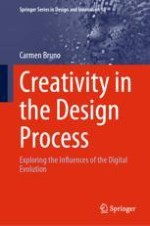2022 | OriginalPaper | Buchkapitel
3. Digital Creativity Dimension: A New Domain for Creativity
verfasst von : Carmen Bruno
Erschienen in: Creativity in the Design Process
Aktivieren Sie unsere intelligente Suche, um passende Fachinhalte oder Patente zu finden.
Wählen Sie Textabschnitte aus um mit Künstlicher Intelligenz passenden Patente zu finden. powered by
Markieren Sie Textabschnitte, um KI-gestützt weitere passende Inhalte zu finden. powered by
